八年级英语上册第六单元重要知识点汇总人教版
人教版八年级英语上第六单元知识点
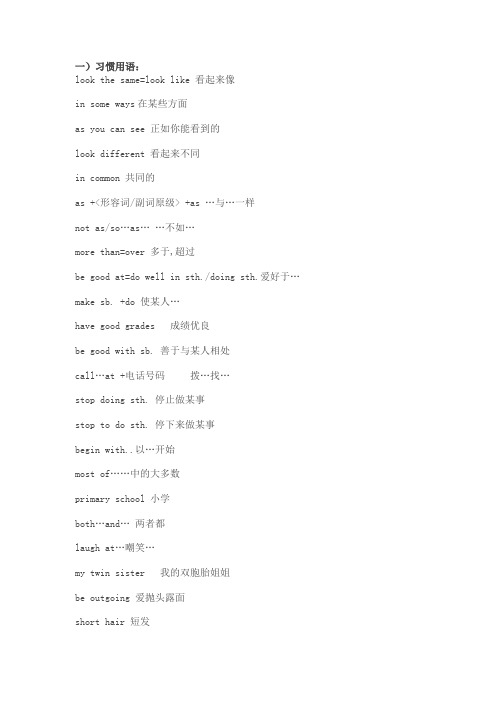
一)习惯用语:look the same=look like 看起来像in some ways在某些方面as you can see 正如你能看到的look different 看起来不同in common 共同的as +<形容词/副词原级> +as …与…一样not as/so…as… …不如…more than=over 多于,超过be good at=do well in sth./doing sth.爱好于…make sb. +do 使某人…have good grades 成绩优良be good with sb. 善于与某人相处call…at +电话号码拨…找…stop doing sth. 停止做某事stop to do sth. 停下来做某事begin with..以…开始most of……中的大多数primary school 小学both…and… 两者都laugh at…嘲笑…my twin sister 我的双胞胎姐姐be outgoing 爱抛头露面short hair 短发more athletic 更健美the same as 同……一样lots of 许多3 centimeters taller 高了三厘米二)重点句型:1.I'm more outgoing than my sister.我比我妹妹更爱出风头。
2.He has shorter hair than Sam.他的头发比山姆的短。
3.Tom is more athletic than Sam.汤姆比山姆更健美。
4.Liu Ying is not as good at sports as her sister.刘莹不如她姐姐擅长体育。
5.Both girls go to lots of parties.两个女孩都参加了许多晚会。
6.In some ways we look the same,and in some ways we look different.在某些方面,我们看起来一样,在某些方面,我们看起来不同。
人教版八年级英语上册第6单元知识点总结
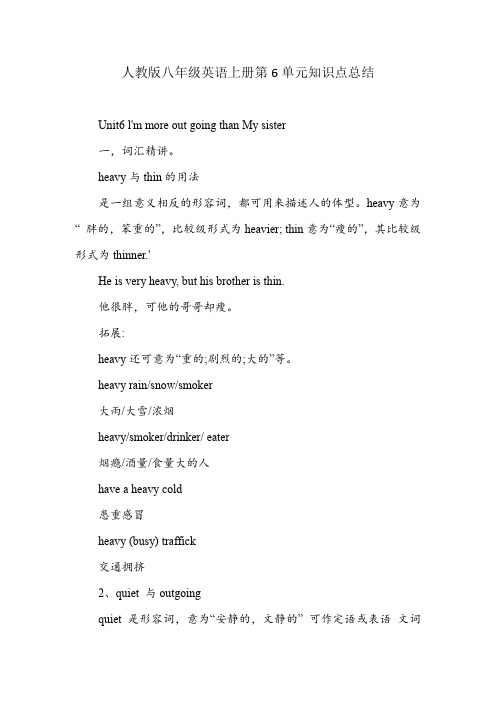
人教版八年级英语上册第6单元知识点总结Unit6 l'm more out going than My sister一,词汇精讲。
heavy与thin的用法是一组意义相反的形容词,都可用来描述人的体型。
heavy意为“ 胖的,笨重的”,比较级形式为heavier; thin意为“瘦的”,其比较级形式为thinner.'He is very heavy, but his brother is thin.他很胖,可他的哥哥却瘦。
拓展:heavy还可意为“重的;剧烈的;大的”等。
heavy rain/snow/smoker大雨/大雪/浓烟heavy/smoker/drinker/ eater烟瘾/酒量/食量大的人have a heavy cold患重感冒heavy (busy) traffick交通拥挤2、quiet 与outgoingquiet是形容词,意为“安静的,文静的” 可作定语或表语文词outgoing; outgoing意为“外向的,友好为;擅于交际的”,其比较级为more outgoingThey walked to a quiet place.他们向一个安静的地方走去。
You have a cold, so you quiet at home.你感冒了,所以必须在家静养。
He is more outgoing than me.他比我更外向。
When we face danger, we should keep calm.面对危险,我们应该保持沉着、冷静。
The baby kept still when she was taking photos.当给这个婴儿拍照时,她一动也不动。
Be quiet, everyone. The teacher is coming. 同学们,安静!老师来了。
We shouldn't keep silent when the teacher asks us some questions.当老师问我们问题时,我们不应该保持沉默。
人教版八年级上册英语第六单元知识点
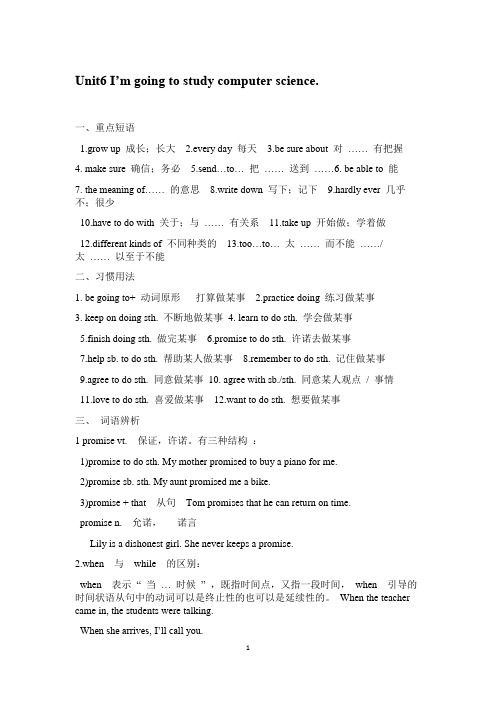
Unit6 I’m going to study computer science.一、重点短语1.grow up 成长;长大2.every day 每天3.be sure about 对…… 有把握4. make sure 确信;务必5.send…to… 把…… 送到……6. be able to 能7. the meaning of…… 的意思8.write down 写下;记下9.hardly ever 几乎不;很少10.have to do with 关于;与…… 有关系11.take up 开始做;学着做12.different kinds of 不同种类的13.too…to… 太…… 而不能……/ 太…… 以至于不能二、习惯用法1. be going to+ 动词原形打算做某事2.practice doing 练习做某事3. keep on doing sth. 不断地做某事4. learn to do sth. 学会做某事5.finish doing sth. 做完某事6.promise to do sth. 许诺去做某事7.help sb. to do sth. 帮助某人做某事8.remember to do sth. 记住做某事9.agree to do sth. 同意做某事10. agree with sb./sth. 同意某人观点/ 事情11.love to do sth. 喜爱做某事12.want to do sth. 想要做某事三、词语辨析1 promise vt. 保证,许诺。
有三种结构:1)promise to do sth. My mother promised to buy a piano for me.2)promise sb. sth. My aunt promised me a bike.3)promise + that 从句Tom promises that he can return on time.promise n. 允诺,诺言Lily is a dishonest girl. She never keeps a promise.2.when 与while 的区别:when 表示“ 当… 时候” ,既指时间点,又指一段时间,when 引导的时间状语从句中的动词可以是终止性的也可以是延续性的。
人教版初二英语八年级上册Unit6知识点
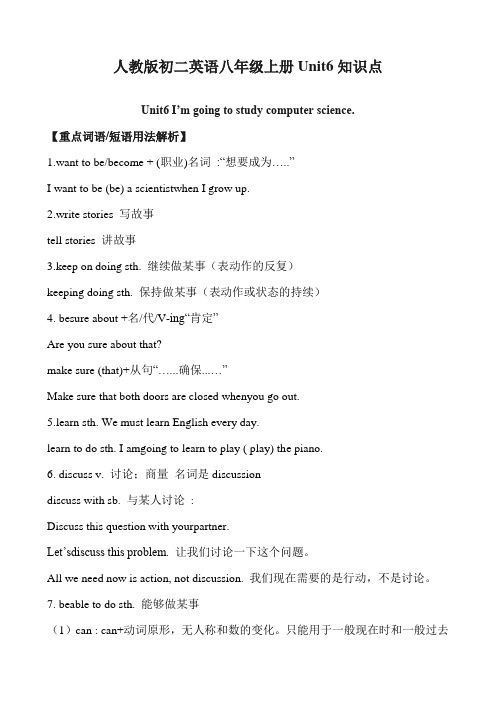
人教版初二英语八年级上册Unit6知识点Unit6 I’m going to study computer science.【重点词语/短语用法解析】1.want to be/become + (职业)名词:“想要成为…..”I want to be (be) a scientistwhen I grow up.2.write stories 写故事tell stories 讲故事3.keep on doing sth. 继续做某事(表动作的反复)keeping doing sth. 保持做某事(表动作或状态的持续)4. besure about +名/代/V-ing“肯定”Are you sure about that?make sure (that)+从句“…...确保...…”Make sure that both doors are closed whenyou go out.5.learn sth. We must learn English every day.learn to do sth. I amgoing to learn to play ( play) the piano.6. discuss v. 讨论;商量名词是discussiondiscuss with sb. 与某人讨论:Discuss this question with yourpartner.Let’sdiscuss this problem. 让我们讨论一下这个问题。
All we need now is action, not discussion. 我们现在需要的是行动,不是讨论。
7. beable to do sth. 能够做某事(1)can : can+动词原形,无人称和数的变化。
只能用于一般现在时和一般过去时,不能用于将来时。
be able to + 动词原形,有人称和数的变化,可用于多种时态。
(2)can 常指客观上能够;be able to 更侧重于经过努力、克服一定困难有能力做成某事。
人教版八年级英语上册Unit 6知识点汇总

Unit 6 I’m going to study computer science.一、短语归纳every day每天be sure about对某事确信make sure 确信/有把握send…to…把…发送到…/把…寄…be able to 能/能够the meaning of …的意思/含义at the beginning of 在…开始的时候write down写下/记下take up 开始从事/着手处理/接受hardly ever 几乎不too…to…太而不能study computer science学习计算机科学computer programmer编程人员grow up长大;成熟;成长keep on doing sth.反复做某事take acting/singing lessons上表演/声乐课finish high school中学毕业have to do with 与…有关for this reason由于这个原因sounds like听起来像the start of the year一年的开始have...in common有相同特征;(想法、兴趣等方面)相同different kinds of不同种类的二、重点句型①What do you want to be when you grow up? 你长大后想成为什么?②—How are you going to do that? 你打算怎样去做?—I’m going to practice basketball every day.我打算每天练习打篮球。
③Well, I’m going to keep on writing stories, of course.哦,我当然会继续坚持写故事。
④My parents want me to be a doctor, but I’m not sure about that.我的父母想要我成为一名医生,但是我还没有确定。
八年级英语上册unit6知识点汇总(2020人教版).doc
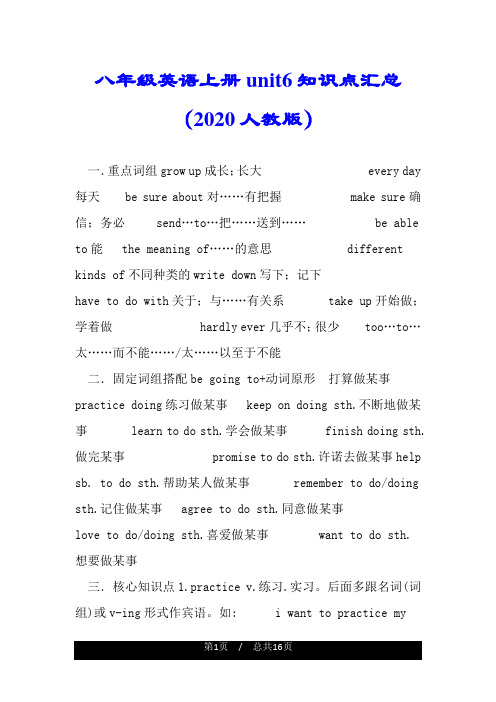
八年级英语上册unit6知识点汇总(2020人教版)一.重点词组grow up成长;长大 every day 每天 be sure about对……有把握 make sure确信;务必send…to…把……送到…… be able to能the meaning of……的意思 different kinds of不同种类的write down写下;记下have to do with关于;与……有关系 take up开始做;学着做 hardly ever几乎不;很少too…to…太……而不能……/太……以至于不能二.固定词组搭配be going to+动词原形打算做某事practice doing练习做某事 keep on doing sth.不断地做某事 learn to do sth.学会做某事 finish doing sth.做完某事 promise to do sth.许诺去做某事help sb. to do sth.帮助某人做某事 remember to do/doing sth.记住做某事 agree to do sth.同意做某事love to do/doing sth.喜爱做某事 want to do sth.想要做某事三.核心知识点1.practice v.练习.实习。
后面多跟名词(词组)或v-ing形式作宾语。
如: i want to practice myspoken english in the english corner this weekend. 这个周末我想去英语角练习口语。
listen! someone is practicing playing the piano. 听!有人在练习弹钢琴。
practice n. 实践;练习;经验。
多为不可数名词。
如: practice makes perfect. [谚]熟能生巧。
have you had any practice in nursing the sick? 你有护理病人的经验吗?2.promise 许诺.1. 承诺,诺言[c][(+of)][+(that)][+to-v] give me your promise that you'll never be late again. 答应我你绝不再迟到了。
人教版八年级上册英语Unit 6 知识点语法归纳总结
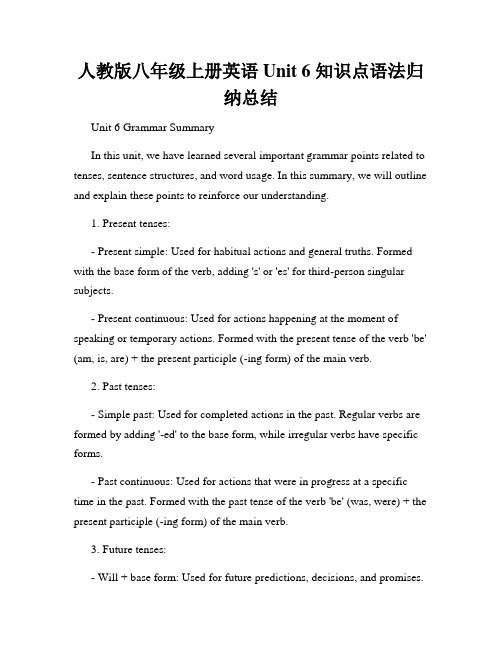
人教版八年级上册英语Unit 6 知识点语法归纳总结Unit 6 Grammar SummaryIn this unit, we have learned several important grammar points related to tenses, sentence structures, and word usage. In this summary, we will outline and explain these points to reinforce our understanding.1. Present tenses:- Present simple: Used for habitual actions and general truths. Formed with the base form of the verb, adding 's' or 'es' for third-person singular subjects.- Present continuous: Used for actions happening at the moment of speaking or temporary actions. Formed with the present tense of the verb 'be' (am, is, are) + the present participle (-ing form) of the main verb.2. Past tenses:- Simple past: Used for completed actions in the past. Regular verbs are formed by adding '-ed' to the base form, while irregular verbs have specific forms.- Past continuous: Used for actions that were in progress at a specific time in the past. Formed with the past tense of the verb 'be' (was, were) + the present participle (-ing form) of the main verb.3. Future tenses:- Will + base form: Used for future predictions, decisions, and promises.- Be going to + base form: Used for future plans or intentions.- Present continuous: Used for future arrangements or fixed plans.4. Gerunds and infinitives:- Gerunds: Verb forms ending in '-ing' that function as nouns.- Infinitives: Base form of the verb preceded by 'to' that can function as nouns, adjectives, or adverbs.5. Passive voice:- Formed with the auxiliary verb 'be' + past participle. The subject of the active voice sentence becomes the object in the passive voice.6. Reported speech:- Reporting verbs such as say, tell, ask, etc., are used to report what someone said.- Reported speech involves changing verb tenses, pronouns, time expressions, and place expressions.7. Conditional sentences:- Zero Conditional: Used for general truths and facts. Formed with present simple in both the if-clause and the main clause.- First Conditional: Used for possible events in the future. Formed with present simple in the if-clause and future simple (will + base form) in the main clause.- Second Conditional: Used for hypothetical or unreal events in the present or future. Formed with past simple in the if-clause and would + base form in the main clause.- Third Conditional: Used for hypothetical or unreal events in the past. Formed with past perfect in the if-clause and would have + past participle in the main clause.8. Comparative and superlative forms:- Comparative: Used to compare two things. Most adjectives add '-er' or use 'more' before the adjective. Irregular forms have specific comparative forms.- Superlative: Used to compare three or more things. Most adjectives add '-est' or use 'most' before the adjective. Irregular forms have specific superlative forms.Remember to practice these grammar points through exercises and conversation to develop a strong foundation in English grammar.。
Unit6单元知识点总结人教版八年级英语上册

2024学年人教版八年级英语上册Unit6单元知识点总结本单元重点短语的具体用法1. grow up:成长;长大。
例如:I want to grow up to be a doctor.(我想长大成为一名医生。
)2. every day:每天。
例如:I exercise every day.(我每天都锻炼。
)3. be sure about:对……有把握。
例如:Are you sure about the answer?(你对这个答案有把握吗?)4. make sure:确信;务必。
例如:Make sure you lock the door before leaving.(务必在离开前锁门。
)5. send…to…:把……送到……。
例如:I will send the letter to you tomorrow.(我明天会把信寄给你。
)6. be able to:能。
例如:He is able to speak several languages.(他能说几种语言。
)7. the meaning of…:……的意思。
例如:Can you explain the meaning of this word?(你能解释这个单词的意思吗?)8. different kinds of:不同种类的。
例如:There are different kinds of flowers in the garden.(花园里有不同种类的花。
)9. write down:写下;记下。
例如:Please write down your name and address.(请写下你的姓名和地址。
)10. have to do with:关于;与……有关系。
例如:This problem has to do with environment.(这个问题与环境有关。
)11. take up:开始做;学着做。
例如:He took up painting last year.(他去年开始学画画。
- 1、下载文档前请自行甄别文档内容的完整性,平台不提供额外的编辑、内容补充、找答案等附加服务。
- 2、"仅部分预览"的文档,不可在线预览部分如存在完整性等问题,可反馈申请退款(可完整预览的文档不适用该条件!)。
- 3、如文档侵犯您的权益,请联系客服反馈,我们会尽快为您处理(人工客服工作时间:9:00-18:30)。
八年级英语上册第六单元重要知识点汇总(人教版)
八年级英语上册第六单元重要知识点汇总(人教版)
短语:
gr up ever da be sure abut ae sure send…t…
be able t the eaning f different inds f the eaning f
in n at the beginning f rite dn have t d ith
tae up hardl ever t…t…
短语用法:
ant t d sth be ging t + 动词原形
pratie ding sth eep n ding sth
learn t d sth finish ding sth
prise t d sth help sb t d sth
reeber t d sth agree t d sth
lve t d sth
be ging t 的用法
1) be ging t + 动词原形——表示将的打算、计划或安排。
常与表示将的trr, next ear等时间状语或hen 引导的时间状语从句连用。
各种句式变换都借助be 动词完成,be随主语有a, is, are 的变换,ging t 后接动词原形。
肯定句:主语+ be ging t + 动词原形+ 其他。
He is ging t tae
the bus there
否定句:主语+ be nt ging t + 动词原形+ 其他I' nt ging t see friends this eeend
一般疑问句:Be + 主语+ ging t + 动词原形+ 其他
肯定回答:es, 主语+ be 否定回答:N, 主语+ be nt
Are u ging t see ur friends this eeend? es ,I a / N, I' nt
特殊疑问句:疑问词+ be + 主语+ ging t + 动词原形+ 其他? hat is he ging t d this eeend? hen are u ging t see ur friends?
2) 如果表示计划去某地,可直接用be ging t + 地点
e are ging t Beiing fr a hlida
3) 表示位置移动的动词,如g , e, leave 等常用进行时表示将。
The bus is ing aunt is leaving fr Beiing next ee
4) be ging t 与ill 的区别:
①对未事情的预测用“ill + 动词原形”表达,ill 没有人称和数的变化,变否定句要在ill 后面加nt, 也可用ill 后面加nt,或者缩略式n't, 变一般疑问句将ill 提至句首。
ill planes be large in the future? es, the ill / N, the n't
②ill 常表示说话人相信或希望要发生的事情,而be ging t 指某事肯定发生,常表示事情很快就要发生。
I believe Lu ill be a great dtr
③陈述将的某个事实用ill
I ill ten ears ld next ear
④表示现在巨大将要做的事情用ill
tired I ill g t bed
'I
⑤表示意愿用ill
I'll tell u the truth
⑥表示计划、打算要做的事情用be ging t, 而不用ill
1 prise vt 保证,许诺。
有三种结构:
1)prise t d sth _____ ther prised t bu a pian fr e
2)prise sb sth _____ aunt prised e a bie
3)prise + that 从句_____ T prises that he an return n tie
prise n 允诺,诺言
Lil is a dishnest girl She never eeps a prise
2hen 与hile 的区别:
hen 表示“当…时候”,既指时间点,又指一段时间,hen 引导的时间状语从句中的动词可以是终止性的也可以是延续性的。
hen the teaher ae in, the students ere taling
hen she arrives, I'll all u
hile 表示“当…时候”,仅指一段时间,从句中的动作必须是延续性的,一般强调主从句的动作同时发生,hile 还可以作并列连词,意为“而、却”,表示对比关系。
Lisa as singing hile her ther as plaing pian
T is strng hile his unger brther is ee
3 pratie vt 练习,后接名词,代词或v-ing 作宾语。
ur elder sister is pratiing the guitar in the r
常跟v-ing 作宾语的动词有:
考虑建议盼原谅:nsider, suggest/advise, l frard t, exuse, pardn
承认推迟没得想:adit, dela/put ff, fan
避免错过继续练:avid, iss, eep/eep n, pratie
否认完成能欣赏:den, finish, en, appreiate
不禁介意与逃亡:an't help , ind, esape
不准冒险凭想象:frbid, ris, iagine
4 everda 与ever da 区别
everda ad 每天的在句中作定语,位于名词前。
This is ur everda her
ever da 副词短语,在句中作状语,位于句首或句末。
He reads bs ever da。
